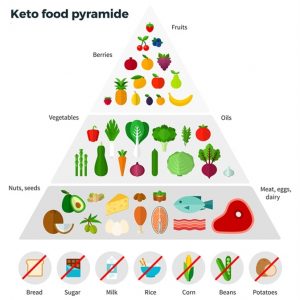Ketoacidosis can potentially prevent your body from functioning optimally, and if ignored, it can have dangerous consequences. Learn about how this condition affects your health and what you can do to prevent it and minimize its effects.
Table of Contents
- 1. What is Ketoacidosis?
- 2. Causes and Symptoms of Ketoacidosis
- 3. Who is at Risk?
- 4. Prevention Strategies for Ketoacidosis
- 5. Treating Ketoacidosis Effectively
- Q&A

1. What is Ketoacidosis?
Ketoacidosis is a potentially life-threatening condition that occurs when the body produces excessive levels of ketones, acidic compounds produced when the body breaks down fat for energy instead of glucose. It is common among people with uncontrolled and undiagnosed diabetes, as their body is unable to produce and use insulin to break down glucose for production of energy.
The main symptoms of ketoacidosis include:
- Excessive thirst and frequent urination
- Confusion
- Drowsiness
- Shortness of breath
- Vomiting
Those who experience any of these symptoms should seek medical help right away as the condition can potentially lead to diabetic comas, and even death. Ketoacidosis can be treated by using fluids to flush the ketone from the body and remove dehydration while regulating blood glucose levels and restoring balance in the body.
2. Causes and Symptoms of Ketoacidosis
Ketoacidosis is a serious metabolic complication that develops when the body’s acid-base balance is disrupted. It occurs when the body produces too many ketones, which overwhelms the organs in charge of helping to maintain that balance. The body then begins to accumulate a high concentration of acids.
The most common causes of ketoacidosis are untreated type 1 diabetes and metabolic disorders. People with type 1 diabetes, for example, fail to produce enough insulin, and this lack of insulin causes a rise in the body’s ketone levels. Without treatment, waste and toxic byproducts can accumulate, leading to ketoacidosis.
The primary symptom of ketoacidosis is an increase in ketone levels in the bloodstream. A lab test of the urine or blood can measure the level of ketones in the body. Other symptoms include rapid and deep breathing, dry skin and mouth, sleepiness and confusion, nausea and vomiting, abdominal pain, and an unexplained, fruity-smelling breath.
3. Who is at Risk?
Most people associate the contraction of waterborne illnesses with the developing world; however, the risk of becoming impaired by water-borne diseases exists all over the world. Moreover, the Centers for Disease Control and Prevention (CDC) recognises that this danger is particularly elevated for certain groups of people.
Everyone is potentially at risk of becoming ill by consuming contaminated water, however, the likelihood is much higher for certain individuals. Pregnant women, children and the elderly are especially vulnerable as their bodies are less able to cope with the bacteria and parasites that cause waterborne illnesses. Additionally, those who are already immuno-compromised are more likely to contract waterborne diseases.
- Pregnant women
- Children
- The elderly
- Immuno-compromised individuals
4. Prevention Strategies for Ketoacidosis
The key to preventing ketoacidosis is proactive management and prevention. Here are some strategies you can use to reduce the risk of developing this serious condition:
- Monitor your blood sugar levels regularly: Track your blood sugar (glucose) levels regularly with a reliable glucometer and establish a consistent pattern of testing. Regular monitoring offers the opportunity to intervene quickly when necessary.
- Maintain a healthy lifestyle: Eating a balanced diet, getting regular exercise, refraining from smoking, and cutting down on alcohol consumption are essential to maintaining good health and reducing risk.
- Take medication as prescribed: Taking insulin or other medications as prescribed can help prevent ketoacidosis. Be sure to discuss any changes in medication with your healthcare provider.
It’s also important to pay attention to diet and exercise, and speak with your healthcare provider to develop coping strategies for factors such as stress or illness that could put you at risk of ketoacidosis. By following preventive strategies, you can reduce the risk of this serious condition and improve your overall health.
5. Treating Ketoacidosis Effectively
People with diabetes may be at risk for ketoacidosis, a dangerous condition resulting from dangerously low blood sugar and the production of ketones. and safely requires immediate intervention.
The first step in treating ketoacidosis is ensuring the patient is stabilized and their blood glucose is back in a safe range. This can be accomplished through administering intravenous fluids and insulin. It’s important to monitor changes in the patient’s blood glucose levels while administering the fluids and insulin.be
- Monitor blood glucose levels
- Administrate intravenous fluids and insulin
- Check the patient’s hydration level
The second step in is to check the patient’s hydration level and make sure they are getting adequate water and electrolytes. In addition, it’s important to check for any underlying medical conditions or concurrent medications that could be contributing to the ketoacidosis. Once the patient’s medical needs are addressed, lifestyle modifications can be used to reduce the risk of future episodes of ketoacidosis.
- Check for any underlying medical conditions
- Start lifestyle modifications
- Regularly check electrolyte levels
Ketoacidosis is a serious condition that can result in serious damage to your health. If you suffer from any of the symptoms mentioned or experience any discomfort related to following a ketogenic diet, make sure to talk with your doctor for a proper diagnosis. Taking proactive steps can ensure your health and safety—and help you prevent or manage the risks of ketoacidosis.











